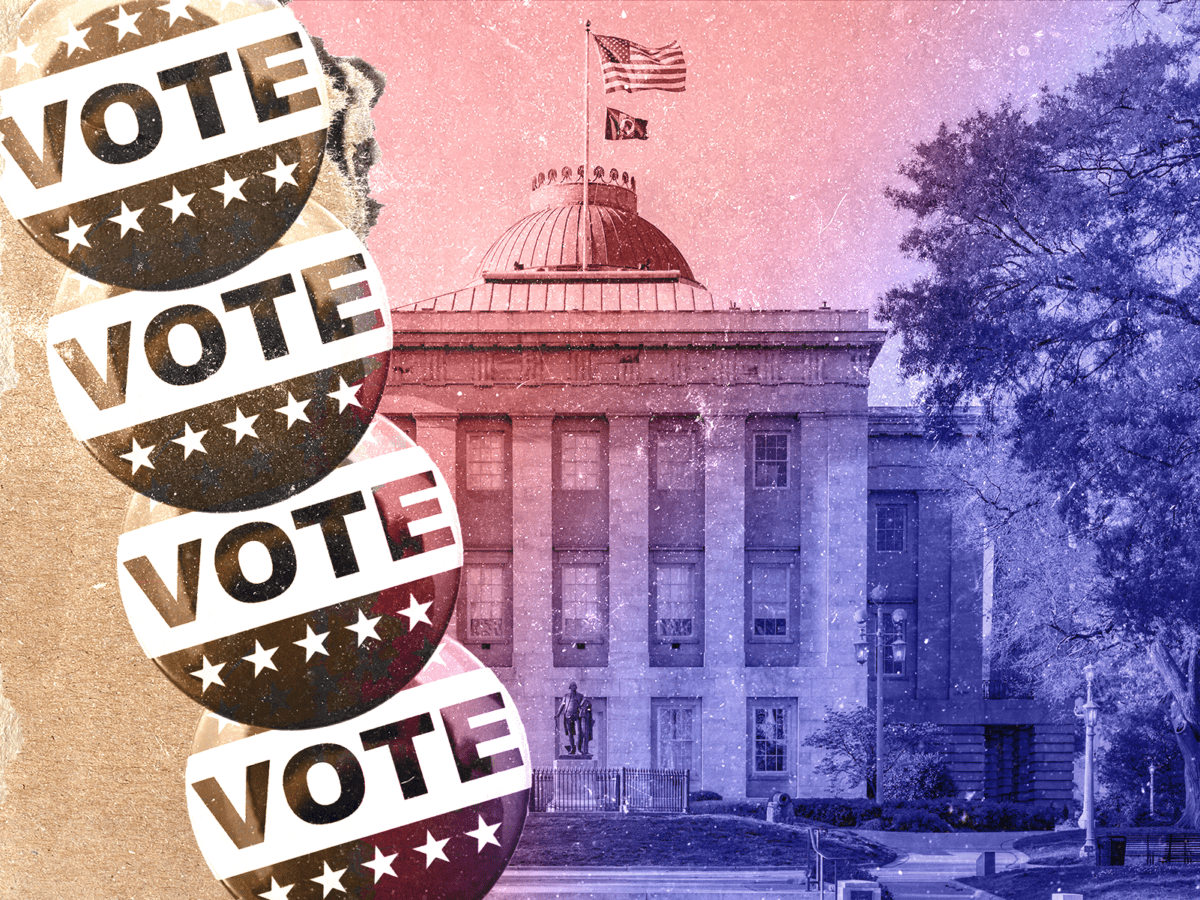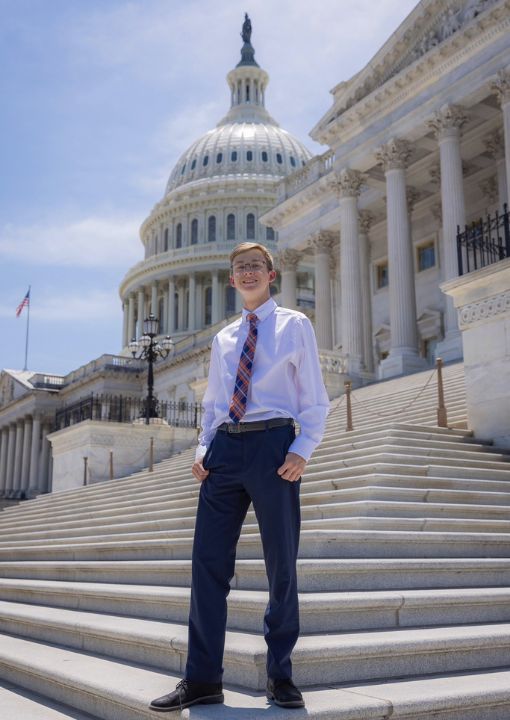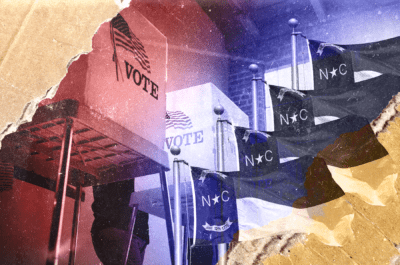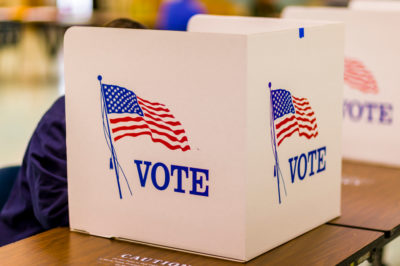
|
|
This story first appeared at The 74, a nonprofit news site covering education. Sign up for free newsletters from The 74 to get more like this in your inbox.
A moderate from an elite world versus a MAGA-backed veteran.
An attorney general versus a lieutenant governor. An ardent supporter of public education versus a skeptic who called educators “wicked” and wants to strip schools of federal funding.
North Carolina’s governor race, dubbed the most important of 2024 by Politico, is reaching its final moments. But in the aftermath of several scandals and increasing political fanfare, the swing state known for nail-biting election days is almost certain to elect Democrat Josh Stein over Republican nominee Mark Robinson.
In late September, as polls were already showing a slight lead for Stein, CNN reported Robinson called himself a “Black Nazi” and posted “slavery is not bad” anonymously on a porn site. Once his cheerleader, former President Donald Trump has since gone silent about Robinson and has not been seen with him in public, even while campaigning in North Carolina. In recent weeks, Robinson has taken to speaking alongside cardboard cutouts of Trump.
“The expectation is with everything dragging Robinson down, Stein should have a good night,” said Michael Bitzer, North Carolina elections expert and politics chair at Catawba College.
But beyond the controversy that’s encircled Robinson – who has kept education debates centered on eradicating the presence of “politics” and “indoctrination” in schools, endorsing book bans and corporal punishment of children – educators and students across the state told The 74 their top concerns are school safety and mental health, teacher pay and recruitment, and school funding.
Their worries reach beyond the gubernatorial race, as the future of who will determine state education policy is in limbo. The state superintendent race is split, with Democrat and former large district superintendent Mo Green holding a tiny lead over far-right candidate and homeschooling advocate, Michele Morrow, who praised “patriots” outside the White House during the January 6 insurrection.
But whether the next governor is Stein or Robinson, the state leader will also appoint individuals for 8-year terms to the state board of education, subject to confirmation by the assembly. At least three seats expire in March 2025, and five of Cooper’s picks have yet to be confirmed. The agency is in charge of policy, including credentialing criteria and what textbooks get used statewide.
“Election day has got everybody a little nervous in the education world in North Carolina,” said Patrick Greene, president of the statewide school leader association and principal of Greene Central High School in Snow Hill, a town just over an hour’s drive southeast of Raleigh.
“I think a lot of us are trying to get people to understand that the implications for this race go beyond party lines,” Greene said. “We need to do a better job of being advocates for people outside of the [education] world to understand how these policies directly affect them, their children, their communities.”
There’s a strong chance North Carolina’s next governor will also contend with a Republican supermajority in the state legislature, where lawmakers have repeatedly overridden current Gov. Roy Cooper’s vetos to push through dozens of laws including a 12-week abortion ban, restrictions on sports and medical treatments for transgender youth, and limitations on classroom discussions about gender – moves condemned by the Human Rights Campaign.
“Those of us who are boots on the ground need progress. We would love for the General Assembly and whichever gubernatorial candidate and state superintendent candidate wins to find some common ground — let’s get some stuff done,” Greene said, advocating for science of reading, teacher prep expansion and “all the things we want to do to make schools as good as they can be, rather than more and more rhetoric each time and blaming each other.”
Stein’s top priority as governor, according to The New York Times, is to improve public education. He has also supported hiring more counselors, nurses, and social workers to address the youth mental health crisis, and wants to expand support and access to community colleges and Historically Black Colleges and Universities.
The two education issues Robinson and Stein have some alignment on are raising teacher pay and expanding career and technical education. The question of how to afford educating the state’s most vulnerable populations, however, is another matter.
‘We need more than we’re getting’
Both Robinson and superintendent candidate Morrow have pushed to expand school vouchers, which would send more public funds to private schools. Gov. Cooper called the effort the “biggest threat to public schools in decades.”
Educators are also anxiously tracking the state supreme court as it wades into a decades-old school funding case, in which parents argued the state formula denied quality education to their impoverished, often rural areas.
Today, the state where more than one in three residents live in rural areas ranks 48th in the nation for how much it spends on each student, more than $4,000 below average.
The vast majority of North Carolina children are educated in public schools, with a little over 32,000 opting for the current voucher system. Similar trends held true in Arizona, another swing state where a recent ProPublica investigation revealed low income families were not accessing the voucher programs marketed to them. “[Families] have options and they’re still choosing us,” said Greene.
Both Robinson and superintendent candidate Morrow have pushed to expand school vouchers, which would send more public funds to private schools. Gov. Cooper called the effort the “biggest threat to public schools in decades.”
Educators are also anxiously tracking the state supreme court as it wades into a decades-old school funding case, in which parents argued the state formula denied quality education to their impoverished, often rural areas.
Today, the state where more than one in three residents live in rural areas ranks 48th in the nation for how much it spends on each student, more than $4,000 below average.
The vast majority of North Carolina children are educated in public schools, with a little over 32,000 opting for the current voucher system. Similar trends held true in Arizona, another swing state where a recent ProPublica investigation revealed low income families were not accessing the voucher programs marketed to them.
“[Families] have options and they’re still choosing us,” said Greene.
Further worrying education advocates, Robinson has said he’d reject federal funds for the states’s schools. “If I had my way about it, they’d send the check and I’d say, ‘Oh, no, you can have it. I don’t want your money. Your money comes with too many rotten obligations. We don’t want it.’”
Last school year, North Carolina received more than $1.6 billion in federal dollars, which went predominantly to low-income schools, students with disabilities, career and technical education, and health programs like nutrition, mental health care and substance abuse support.
“That’s scary in the world of the people who legally are bound to provide that. We don’t know where the resources would come from,” Greene added. “Quite honestly, we need more than we’re getting, I think like a lot of states that are predominantly rural.”
Legacies of ‘hateful rhetoric’
Following in Trump’s footsteps, Robinson originally appealed to voters with a compelling personal story. He grew up a poor child in Greensboro, had faced multiple bankruptcies, and was a furniture-maker-turned lieutenant-governor in his first political bid after brief virality for a speech in defense of gun rights.
Despite threats to preserving quality education for poor students, those with disabilities and LGBTQ youth, North Carolina students interviewed by The 74 are eager to vote and share optimism for the future.
“With all of this really extremist speech, I get to see firsthand how students my age are two things: either unmotivated to vote or talk about politics at all, or they’re really motivated because they’re frustrated and angry,” said Tai Stephan, 18, a first year student at the University of North Carolina and child of educators. “They’re educating themselves, they’re voting, they’re talking about things and to anyone that’s unmotivated.”
Voting for the first time, Stephan said he is supporting candidates promoting equality and safety. His campus is one of several universities acting in alignment with Robinson’s wishes, banning any diversity, equity and inclusion efforts including ending 59 staff positions. People “so beyond angry” are acting to change the policy they believe to be unjust, hosting teach-ins, speeches and considering lawsuits, risking possible disciplinary action.
“They’re so frustrated that it goes beyond their educational prestige. It’s really scary to see a lot of groups at risk for losing the oasis they have in within schools… It shows that a lot of minority students are being attacked via legislation and where our country is moving if we don’t get out and vote.”

For Evan Keith, 18 and a senior at Forest Hills High School in the southern, central North Carolina town of Marshville, it’s been difficult to see his peers feel discouraged by politics, with many thinking “even if we vote for a certain person, not a lot will change.”
At a time when educators and students are also fueling charges to curb the prevalence of school shootings, a Stein governorship feels like a safer choice.
“I hope that our governor, whoever it is, will really push to make safety a top priority, and mental health, as [they] really do affect everything: grades, performances on tests, and job confidence with our employers,” said Keith, also a first time voter this November.
While it remains to be seen how Hurricane Helene recovery may impact election day, early voting has yielded a record high turnout.
Education advocates are urging voters to look beyond affiliation, as some already have, to “do their homework and find the person that’s gonna help kids the most,” said Greene. “And if they don’t know, talk to somebody who works in education, because usually we’re happy to tell you.”




